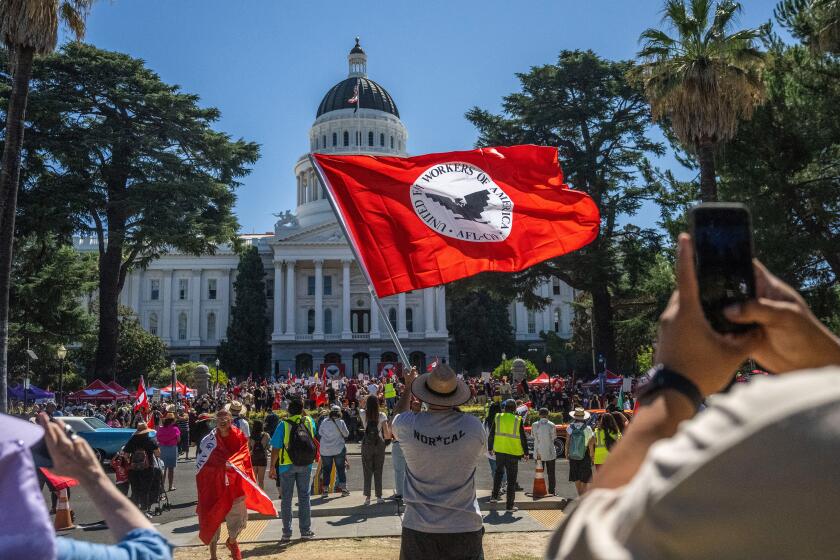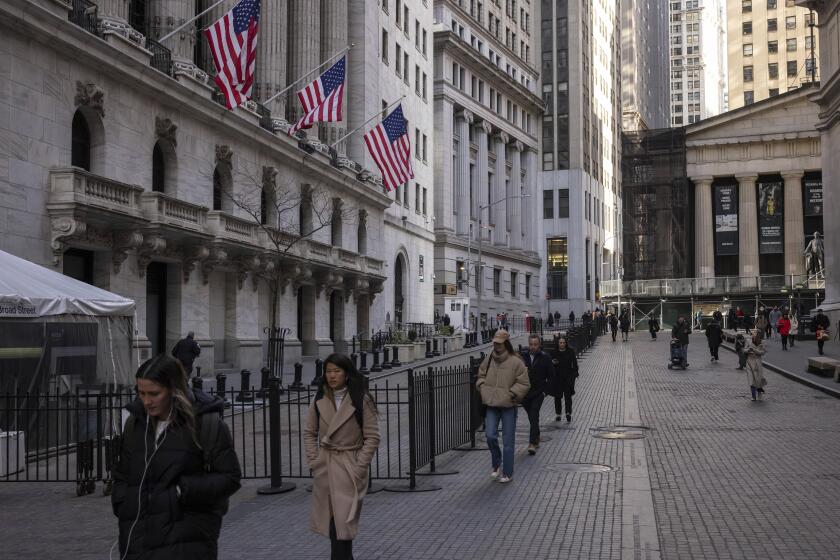UAL Rejects Bids; Unions Will Press Pay, Benefit Talks
UAL Corp., parent of United Airlines, on Tuesday rejected two buyout offers from its unions, but the unions said they would not give up.
The action by UAL’s board had been expected since the unions failed last week to come up with bank financing for an offer. It was the fourth failed takeover bid for UAL in less than four years.
UAL’s shares fell $3.25 to $88 in trading on the New York Stock Exchange after the failure of the deal was announced. With the takeover trauma behind it, at least for now, UAL said it plans to get on with business.
The company said it will seek to reach new contracts with its unions, whose members include pilots, mechanics and flight attendants. The Chicago-based company also said it will go ahead with a $15-billion order for wide-body aircraft that had been postponed at the request of the unions.
The labor groups had wanted to use the huge aircraft order as a carrot to entice financial support for their buyout from aircraft and engine makers, such as Boeing, Airbus Industrie and General Electric.
Even with a union buyout on hold, UAL’s management may be in for a rough ride. Its unions, in a joint statement Tuesday, said they would seek “substantial improvements in wages and benefits” and would “pursue all means necessary”--including a strike--”to produce these results.”
The board did not address the concerns of its largest shareholder, Coniston Partners, a New York investment firm that had pressed for a transaction that would increase the value of UAL’s shares. Augustus Oliver, one of the firm’s three partners, said the investors were reviewing their options.
“We expect to be talking with the unions and with management in the next week or so,” he said. “Based on such talks, we will make a judgment if there is any further action we’ll take. I think that the action the board took was predictable, and now that it has been taken, we need to sit down and talk with all the parties.”
Coniston, which owns 11.8% of UAL’s shares, bought its stake at an average price per share of $160 each. The partnership had previously threatened to oust the UAL board to force a sale or recapitalization, but it put those threats on hold so the unions could pursue an offer for the company.
Airline industry analysts said it is possible that UAL could still undergo some kind of restructuring, perhaps involving a sale-leaseback of its airliners, to make possible some kind of payment to shareholders.
“If Coniston raises issues, the board will have to address them,” said Thomas Longman, an airline industry analyst with the Bear Stearns investment firm in New York.
UAL, in its statement, made an effort to put to rest speculation about the leadership of the company. The unions had accused UAL Chairman Stephen M. Wolf of undermining their buyout efforts and had said that they intended to replace him if they acquired the airline. In a statement Tuesday, the three unions reiterated their lack of faith in Wolf and UAL’s senior management.
There had been speculation on Wall Street that the chasm between labor and management might force the board to replace Wolf. But UAL director Richard P. Cooley, who is also chairman and chief executive of Seafirst Corp., a Seattle banking firm, praised Wolf as the leader of an “able, experienced and dedicated management team” and said the board supports him unanimously.
UAL said its directors terminated an April agreement to sell the company to the unions for $201 a share and rejected two new offers as inadequate and tentative. In a statement, UAL said that, based on advice from its financial adviser First Boston Corp., the board “unanimously determined that (the unions’) new proposal is not in the best interest of the shareholders.”
The unions acknowledged that they had presented the board with two new proposals. One would have been financed with $750 million in hoped-for contributions from aircraft and engine manufacturers, cash generated from sale-leaseback arrangements, $200 million from a pilot retirement fund and UAL’s own cash. The unions said shareholders would have received $70 in cash and securities worth $135 for each UAL share.
The second proposal was an all-paper offer in which shareholders would have received $178 in senior notes and $25 in preferred stock for each UAL share.
“We regret that United’s board of directors has rejected our effort to stabilize the airline and provide value to its shareholders through employee ownership,” Gerald Greenwald, leader of the union buyout effort, said in a statement. “We continue to believe that employee ownership is the only answer for employees and stockholders alike.”
Greenwald said the unions would continue to pursue employee ownership while they returned “to traditional trade union activities,” such as negotiating new contracts.
UAL said it would seek federal mediation in its contract negotiations with pilots and flight attendants, in an apparent attempt to ease potentially explosive contract talks. The company said that, since the pilots are further along in their contract talks, UAL would seek binding arbitration to resolve issues not settled with pilots in mediation.
James Hanson, a spokesman for United’s pilots, said the group would seek an “industry-leading contract” while it continued to pursue employee ownership with the other unions.
The machinists and pilots unions have said previously that they would strike if the board rejected their buyout offer. However, they must exhaust the negotiation process before they can do so legally, so any strike is some time away.
Commenting on the board’s rejection of the union bid, Hanson said: “We are disappointed that the board decided not to sell the company to us at a price that is greater than what Wolf sold his shares for.”
The unions are bitter that Wolf sold his most of his stock appreciation rights in May at a time when UAL’s shares traded at about $150. The unions say Wolf’s action, which netted him a $14-million profit, signaled a lack of confidence in the union offer and in the value of the airline.
A spokesman for Wolf has said that the chairman sold his rights because he feared that the unions might try to nullify them if they won control of the company.
The board rejected the union buyout offer after a lengthy meeting that began Monday afternoon at a hotel near Chicago’s O’Hare International Airport. The board’s advisers had been briefed on the union proposals Sunday.
Greenwald presented the union’s offer to the board personally and, after he concluded his presentation, thanked the board for its cooperation.
Greenwald resigned as vice chairman of Chrysler Corp. to lead the unions’ effort to buy UAL. He has a one-year contract that expires next spring.
NEXT STEP UAL Chairman Stephen M. Wolf faces potentially stormy contract talks with the United Airlines’ pilots, machinists and flight attendants now that the board has rejected the employees’ bid to buy the company. Wolf must also find a way to make UAL’s biggest shareholder happy. Analysts said the shareholder, the Coniston Partners investment firm, may have enough clout to oust UAL’s board or force a recapitalization of the firm.
THE CHRONOLOGY OF UAL
The price of UAL Corp’s stock has rode a roller coaster through various attempts to buy the airline. The latest chapter ended--at least for now--with UAL’s rejection Tuesday of the latest employee buyout offer, and the stock price responded.
August, 1989: Los Angeles investor Marvin Davis bids $5.4 billion, or $240 a share, for UAL Corp. He later sweetens the offer to $6.19 billion, or $275 a share.
September: UAL directors accept a $6.75-billion offer, or $300 a share, from United’s pilots, management and British Airways PLC. The offer includes labor and wage concessions. Davis says he will match the offer and demand no labor concessions.
October: Proposed takeover by pilots, management and British Airways collapses when financing fails. The same day on Wall Street, the Dow Jones average of 30 industrials falls 190 points. Davis withdraws his matching bid a few days later.
January, 1990: United’s three labor unions say they are willing to buy 75% of UAL stock. Directors say it is not a formal acquisition bid and tell their advisers to try to come up with a firm proposal.
March 1990: UAL unions come up with a $3.8-billion acquisition offer. The investment group Coniston Partners, which holds 11.8% of UAL stock, warns that it will engage in a proxy fight to oust UAL’s board unless the board agrees to the employee buyout.
March 22: The UAL board says the union buyout offer has “serious deficiencies” but agrees to negotiate. It also directs its financial advisers to develop plan to sell company assets and consider buyout bids from other suitors.
April 6: After all-night session, UAL board announces that it has agreed to an buyout offer by employees at $201 a share, or $4.38 billion.
Sept. 27: Los Angeles billionaire Marvin Davis makes another offer to buy UAL, which would give the unions an option to buy him out after two years.
Oct. 2: The unions extend their Oct. 3 financing deadline one week to provide banks with new financial projections that reflect higher fuel prices resulting from the Persian Gulf crisis.
Oct. 9: The UAL board rejects the employee buyout, calling it too low and not in the interest of its shareholders but says it it still open to a fair offer for the carrier. Stock trading is halted ahead of the announcement but later UAL closes down $3.25 to $88.00 when trading resumes. The stock had fallen $11.50 a share Monday.






